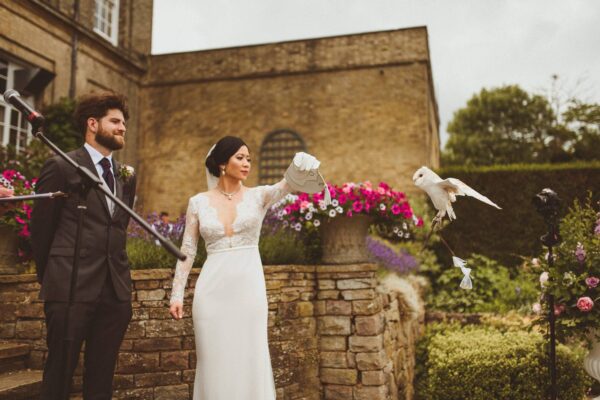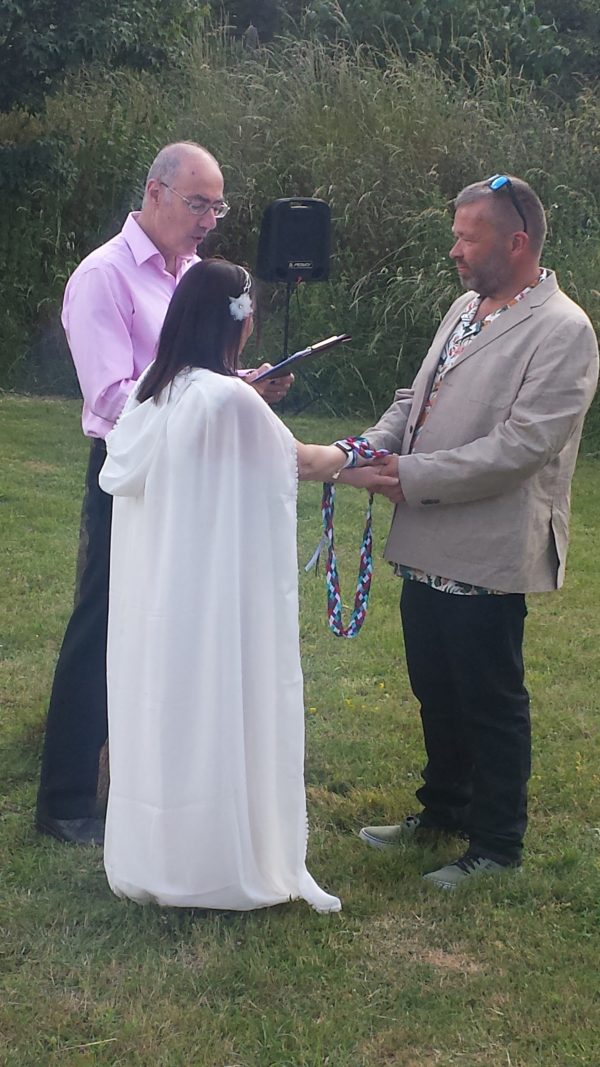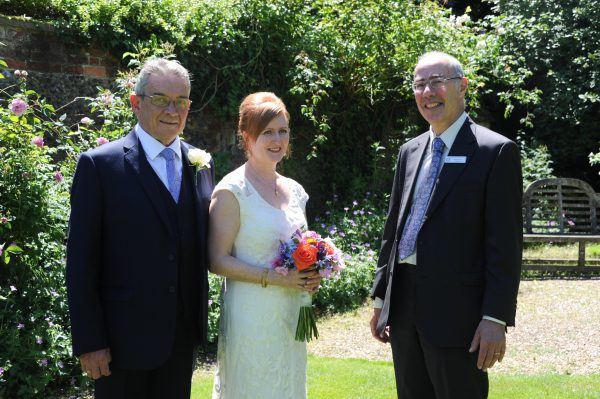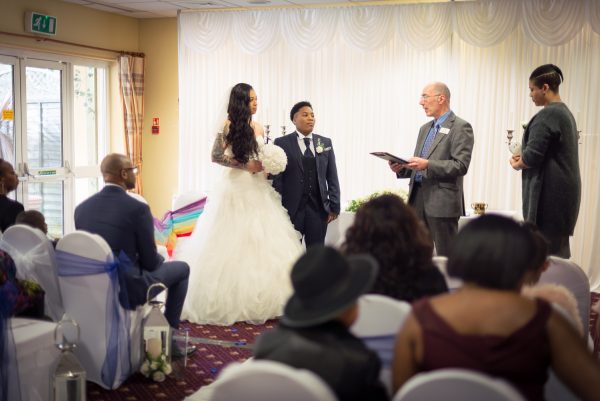
by Michael | Jul 4, 2023 | Blog
Before you commit, you’re going to have questions to ask your celebrant. That’s normal.
I’m going to anticipate some of them for you.
How can I trust the Celebrant?
Word of mouth is obviously a good starting-point. However, you may not have witnessed a celebrant in action. You also may not know anybody who can recommend one to you.
The next best thing is to have a look at the Celebrant’s website. Look especially at testimonials (and also how the celebrant says they work with clients). The testimonials may reveal the celebrant’s strengths. Do these resonate for you too?
Before signing anything, have a chat with your celebrant. On the phone, by Zoom, or, best of all, face-to-face. Apart from anything else, you’re going to want to know that you can feel confident in your celebrant – and would be happy to work with them on your big day.
What about Cost and Ts & Cs?
However, unattractive it may be, reading the Ts and Cs is essential, if only for peace of mind. If you don’t understand something, then ask for clarification. You need to know precisely what the celebrant is offering – and what might not be included.
Your budget will dictate your outlay, of course, but, within reason, don’t despair if the celebrant is asking a little more than you had in mind. It’s important – and not that easy – to find someone who is right for you both, and worth paying for. If necessary, you may be able to save a little elsewhere, and use that to make up any deficit.
How about Cancellation?
Again, the Ts and Cs should cover this, but I take a non-refundable deposit (because I may have rejected work by accepting your booking). I am normally happy to rearrange, if some major change forces a postponement, and normally do this without extra charge.
If I have to cancel (but I never have in 10 years), then I will reimburse your balance and do my best to find a suitable replacement.
What USP can a Celebrant Offer?
A celebrant can give you variety. Depending on their processes, they can conduct a serious, even religious ceremony, or a spiritual one, or a combination. They can vary the tone. They can hold your hand throughout (not literally!), or let you realise your vision and merely advise. They can suggest and conduct spiritual rituals.
They are normally accomplished writers and presenters and can make any ceremony very special.
If you have further questions, please don’t hesitate to contact me.
Photo: aiony-haust-xCQm5_9aro0-unsplash

by Michael | Jun 20, 2023 | Blog
It can be dangerous to cut corners when planning weddings. However, it is not always necessary to “go the whole hog”. You can make savings.
Clearly, there are going to be differences between a society wedding and one with a dozen guests. Then there are destination weddings and back garden affairs. I won’t attempt to cover all of these here!
What I am suggesting is some short cuts that, if administered judiciously, should be safe and convenient – and save you some money!
Venue
At one extreme, you can (as indicated) hold a ceremony in your back garden. However, everything – including health and safety aspects – is down to you. You certainly won’t get the peace of mind a hotel (say) should offer you.
If booking a venue, you may be able to barter a little, especially if you’re happy to go out of season with your event. Summer is likely to be most expensive. Arranging your do earlier in the day may work out cheaper.
Wedding Planner
If you’re having a small wedding (especially if you’re using a venue with its own event planner), you may not need a wedding planner as well. Otherwise, I would suggest you at least consider using one.
Planners have contacts across the industry and may actually be able to save you money on suppliers. They take the worry out of the planning and running of the day, which can be invaluable.
You can usually choose either to book a planner for the whole process or simply book one for the day.
Catering
With a small event, you may be able to get away with organising this aspect yourself. But bear in mind that you will have to consider buying in the food and drink, setting up the seating, providing crockery and cutlery etc., heating (if appropriate) and serving the food (safely). Then you may need to cater for those with special dietary requirements (vegans, gluten-free, children, and so on).What about the clearing up?
Having the event professionally catered will not necessarily cost much more than doing it yourself, but will be a weight off your mind (and feet!).
Entertainment
This is down to you! Do you want a disco (but will elderly guests?!)? Do you want a DJ or MC? What about photo booths? A magician, perhaps?
Or none of them?!
Officiant
If you know someone who is a good public-speaker, could they take the service? You may be able to save some money that way. True, they may not be good at putting a memorable ceremony together, but they are a possibility, though not one I recommend.
However, a professional (like myself!) will put a lot of work in to ensure that the ceremony is unique and just what you want. Then, with their demeanour, professionalism and experience, they will virtually guarantee a truly memorable ceremony. You will be able to relax, confident in their ability, and that’s worth a lot.
Musicians and Florists
Live music is usually better for atmosphere, but may well cost more that a DJ.
In-season flowers will probably cost less than more exotic ones. You may choose to go easy on more expansive (and expensive) colour themes, if you want to cut a corner.
Photographers/Videographers
Not something I would skimp on. Those memories are irreplaceable. What if you got a friend to take the photos, and they made a mistake and couldn’t take any? Apart from the loss of tangible memories, would the relationship with that friend endure?
So splash out for these (although there are cheaper ones who are still very good).
Extras
I haven’t talked about rings, clothes or make-up artists, for example, which are probably de rigueur, as far as requirements go.
But there are other extras that you could avoid, if on a tight budget. Lovely as it was, having a barn owl deliver the ring for blessing, did not come cheap. Was it really necessary?
Well, it depends on your viewpoint and pockets.
For more advice, feel free to contact me, but I hope that this was a useful start.
Photo: Matt Penberthy

by Michael | Oct 18, 2022 | Blog
Unless you’ve actually been married already (and not necessarily even then!), you’ll make assumptions about weddings that aren’t necessarily true.
I’m going to take a few of these and set things straight.
Officiant
The registrar is not the only possible officiant. However, a marriage has got to be legally registered and, unless you marry under the auspices of certain religions (notably, C of E, Jewish or Quaker) which cover this, you’ll need to involve the Register Office.
You won’t necessarily need to go out to the Office. Registrars can come to your venue (depending on its compliance with certain stipulations) and conduct the ceremony there. The ceremony will be totally secular.
Apart from that, you have the option of a civil celebrant. (Currently – but this may change next July depending on the decision on the legislation reforms – civil celebrant ceremonies have no legal validity.) They are additional to Register Office services, offering the advantage of being fresh, even unique. They are certainly not standard and can reflect the couple’s beliefs and personalities.
Ceremony
With a civil celebrant, you have choice as to the type of ceremony you opt for. It can be quite wacky – but doesn’t have to be so. It can be relatively conventional. It can be part or wholly religious. So don’t go thinking that celebrant ceremonies have to be woo-woo!
But they can be, of course.
Cost
Everyone assumes that you need to take out a couple of mortgages to finance a wedding. Indeed, that may be the case, if you think too big. However, there are ways to reduce costs (eg making your ceremony off-peak, operating a cash bar, etc.).
But the point is that this should be a unique, unforgettable day, and that it really is worth pushing the boat out this once. You can’t put a price on memories.
Pressure on Couples
Your wedding may be subsidised or even paid for by others; that doesn’t mean that someone else should dictate what goes in, or stays out of, the agenda. It’s your big day, and that fact should be respected..
If pressure is being applied regarding the ceremony, remember that your officiant will be there for you and will support you.
So I hope these canards have been laid to rest. If I can help disperse any other misconceptions, don’t hesitate to ask.

by Michael | Apr 11, 2022 | Blog
It’s understandable that I get asked what a civil celebrant actually is. I hope this blog will give you answers and paint a clearer picture, so you can see the potential benefits of working with one.
Here are a few questions I get all the time.
Are you a Humanist?
The short answer is “no”, but, in fact, I am much more than that. A Humanist is not supposed to include religious elements (or even the word “God”) in their service. However, if you want a secular service, you don’t need to resort to Humanists.
A civil celebrant can conduct a non-religious ceremony (as well as a part-religious or mixed-faith one). So that’s simple enough.
How much contact time is there between myself and officiant?
You will only meet the registrars for the first time at the marriage ceremony. The same may go for your vicar, if you’re having a church service. That’s not normally the case with a civil celebrant.
Apart from an introductory, discovery call (or visit) after your initial contact, you have access to your celebrant at all reasonable times from the time of booking until the day of the ceremony. So if you have queries or issues, it is easy to resolve them and you will feel more relaxed on the day because you will have established a close relationship with your celebrant.
How much control do I have over what goes into the service?
Only if you are working with a civil celebrant will you get free choice. Of course, you will also get guidance and advice, if wanted. Your ceremony will not be not standard or pre-ordained. You can have your own readings, vows or rituals – anything to make your ceremony personal and unique.
A church service is set in stone and the registrars offer a standard service, although sometimes they offer a modicum of choice.
So the content is basically unrestricted, if you work with a civil celebrant.
What about location and timing?
The church or Register Office ceremony is normally limited to “office hours”. A civil celebrant has no restrictions on when the ceremony can take place.
Likewise, with the location. A civil celebrant will conduct a ceremony for you almost literally anywhere. That’s clearly not the case with church weddings, and there are conditions to be complied with, in the case of Register Office services.
Hopefully, this will have clarified things a lot, but if you have further questions, please feel free to ask me!

by Michael | Nov 29, 2021 | Blog
You’re getting married? Congratulations! Have you decided who will be the officiant? Will it be a priest (or equivalent), a registrar or a civil celebrant? Did you even realise that you have a choice?!
[This post is designed for English or Welsh couples, although laws are set to change in the not-too-distant future. Separate rules apply to Scotland and Ireland.]
Religion
If you are marrying in an Anglican church, this is as simple as it gets. You will be able to combine religious and legal in one ceremony. The same applies for Jewish and Quaker weddings.
Otherwise, you will have to arrange a trip to the register office and to the (non-C of E) church before you can be declared married.
Registrars
The registrars come at the other end of the spectrum to priests, although both services are pretty much standardised. The registrars are not permitted even to mention God or religion. What they do, however, is to pronounce the legal words. Without these being uttered and witnessed, no marriage is currently valid.
You need to make an appointment with the registrars and go to their office with two witnesses. Or the registrars may come to the venue of your choice (currently, there are restrictions, such as a minimum requirement of four solid walls, although this is changing). Be aware that this will cost you substantially more.
The registrars will offer you a minimum of choice as to the service structure. And their presentation skills can vary profoundly!
Celebrants
Until the law changes, possibly in late 2022, civil celebrants cannot marry people legally. They can bless them, conduct a part-religious (or even wholly-religious) service, hand-fast them, get them to sign a marriage certificate afterwards, but none of these make the marriage legal.
So what normally happens in these cases is that the couple marries first. The venue is the register office, unless the registrars come out (which is hardly happening under current restrictions). The ceremony takes place in a private room or in front of guests.
When the registrars have left, the civil celebrant can stand up and publicly conduct the personalised ceremony the couple have been dreaming of. It may be religious, or partly so; it may be (partly) humorous; it may contain ritual; active participation may be invited; favourite readings or music may be chosen; it is going to be unique to the couple.
At the end, the celebrant may declare the couple legally married (as long as the registrar service has been completed!).
The point is that, by using a celebrant, you have free choice as to the tone and content of your ceremony on your big day.
It’s all a bit confusing, I know! But if you want any further clarification on this issue, please feel free to contact me.





